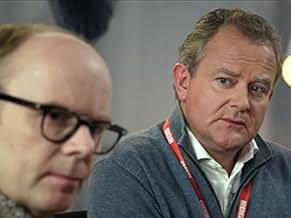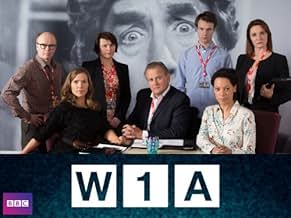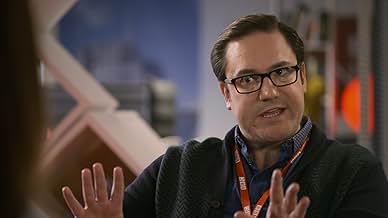Ian Fletcher, formerly the Head of the Olympic Deliverance Commission, has taken up the position of Head of Values at the BBC.Ian Fletcher, formerly the Head of the Olympic Deliverance Commission, has taken up the position of Head of Values at the BBC.Ian Fletcher, formerly the Head of the Olympic Deliverance Commission, has taken up the position of Head of Values at the BBC.
- Won 1 BAFTA Award
- 3 wins & 3 nominations total
Browse episodes
Featured reviews
10hi_and
A hilarious skewering of both the BBC and the mindset of corporate lackeys everywhere. Absolutely crammed with great characters, many of whom, in the British manner, have their distinctive and increasingly wonderful catch-phrases. It seems impossible that this got made by the same organization that is portrayed in the show, but it is very pleasing that it was. It's just a shame that the number of episodes per season is small even by UK standards.
This is a very well observed comedy. The setting for the programme is the BBC but it could be any big company. Ian Fletcher of 2012 fame joins the BBC as its head of values. Being the new boy in town he struggles with the entrenched working practices. Senior management float from meeting to meeting without making any decisions which they leave to their subordinates who were are too busy to attend.
The PR company who got it completely wrong in 2012 are invited back to keep us amused in W1A. It struck me after watching it that people under 30 have spent most of their lives with the internet and cable TV. Hence Perfect Curve's take on the BBC logo is probably closer to truth than fiction.
A few stories run through the programme and mostly serve to make Ian's life a nightmare. It would be interesting to watch this without the commentary and to see how events pan out without an introduction to every scene.
As to whether the publicly owned BBC should be making a programme satirising themselves: that is open to question. You have to imagine that Broadcasting House is not as badly appointed as portrayed. But, as noted above, anyone who has worked for a big company will raise a wry smile at some of the goings on.
The PR company who got it completely wrong in 2012 are invited back to keep us amused in W1A. It struck me after watching it that people under 30 have spent most of their lives with the internet and cable TV. Hence Perfect Curve's take on the BBC logo is probably closer to truth than fiction.
A few stories run through the programme and mostly serve to make Ian's life a nightmare. It would be interesting to watch this without the commentary and to see how events pan out without an introduction to every scene.
As to whether the publicly owned BBC should be making a programme satirising themselves: that is open to question. You have to imagine that Broadcasting House is not as badly appointed as portrayed. But, as noted above, anyone who has worked for a big company will raise a wry smile at some of the goings on.
Not sure an American audience would get this show as it very definitely reflects British cultural and social situations.
I suppose the natural career change for "2012"'s Olympics supremo Ian Fletcher was to an executive position at another of the great talking-shops, the BBC itself. Thus "W1A" continues very much in the footprints of its predecessor, with Fletcher at the centre of the middle of things at the Beeb, quickly becoming the spokesperson and whipping boy for a number of topical-at-the-time scandals at the corporation, involving regional discrimination and pay levels. Now with the Quango-esque title "Head Of Values" he's soon involved with a similar group of headless deadbeats talking lots but saying little in another amusing spoof comedy.
The problem for me was the too-similar format to "2012" right down to each episode starting with him turning up to work and attending morning meetings although this time there was much less emphasis on his private life. The supporting cast includes the excruciatingly on-point media guru Siobhan "Sure, great" from the show before and a bunch of colleagues not markedly different again to those before. Therein lies the problem, with the show somewhat lacking in freshness with not only the characters but some of the plot devices seeming a bit second hand. I also think more could have been done to make use of the real-life BBC talent available apart from the amusing spat between Clare Balding and Carol Vorderman to see who gets to partner Alan Titchmarsh in a new reality show "The Tastiest Village in Britain".
There are amusing moments for sure particularly when Siobhan attempts to rebrand the BBC for the Apps market and Bonneville leads a good cast who play their quirky characters to the hilt. Nice to see Olivia Colman in a cameo role too. All told though, the law of diminishing returns appears to be in action here although somehow it wouldn't surprise me to see Ian Fletcher in future park his fold-down bike at the biggest talking-shop of all the House of Commons in an as yet unwritten sequel to his latest misadventures.
The problem for me was the too-similar format to "2012" right down to each episode starting with him turning up to work and attending morning meetings although this time there was much less emphasis on his private life. The supporting cast includes the excruciatingly on-point media guru Siobhan "Sure, great" from the show before and a bunch of colleagues not markedly different again to those before. Therein lies the problem, with the show somewhat lacking in freshness with not only the characters but some of the plot devices seeming a bit second hand. I also think more could have been done to make use of the real-life BBC talent available apart from the amusing spat between Clare Balding and Carol Vorderman to see who gets to partner Alan Titchmarsh in a new reality show "The Tastiest Village in Britain".
There are amusing moments for sure particularly when Siobhan attempts to rebrand the BBC for the Apps market and Bonneville leads a good cast who play their quirky characters to the hilt. Nice to see Olivia Colman in a cameo role too. All told though, the law of diminishing returns appears to be in action here although somehow it wouldn't surprise me to see Ian Fletcher in future park his fold-down bike at the biggest talking-shop of all the House of Commons in an as yet unwritten sequel to his latest misadventures.
Such a great series I watched it twice. Wonderfully acted and written, the single word interplay between the characters is a marvel. The discipline and skill to pull off the rapid-fire exchanges is something to behold. While much of the humour is broad, much of it is wonderfully narrow British irreverence and wit. But the glue that holds it together is Hugh Skinner's Will. His beautifully-timed nonsensical statements sum up the entire series, making fun of corporate culture that has lost its ability to communicate, saved at the last moment by the erudite adult in the room, Ian Fletcher.
Did you know
- TriviaThe cast list gives Ben and Jerry's surnames as Rosenstern and Guildencranz. This is a reference to Rosencrantz and Guildernstern, two minor characters in Shakespeare's play National Theatre Live: Hamlet (2015). In Tom Stoppard's play of 1966 National Theatre Live: Rosencrantz & Guildenstern Are Dead (2017) he flips the plot and they become the major characters. In Stoppard's play they are like two halves of a single character and other characters in the play have trouble distinguishing which one is which; much like the hapless Ben and Jerry.
- ConnectionsFeatured in The Wright Stuff: Episode #19.55 (2014)
- How many seasons does W1A have?Powered by Alexa
Details
Contribute to this page
Suggest an edit or add missing content



































